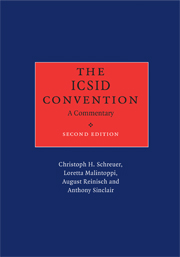Book contents
- Frontmatter
- Contents
- Foreword by Professor Sir Elihu Lauterpacht, CBE, QC
- Authors' preface to the second edition
- Table of cases
- List of abbreviations
- Text of the ICSID Convention
- Procedural calendar
- PREAMBLE
- CHAPTER I International Centre for Settlement of Investment Disputes
- Article 1 Establishment of Centre
- Article 2 Seat of Centre
- Article 3 Organization of Centre
- Article 4 Composition of Administrative Council
- Article 5 Chairman of Administrative Council
- Article 6 Functions of Administrative Council
- Article 7 Decisions of Administrative Council
- Article 8 No Remuneration for Members
- Article 9 Composition of Secretariat
- Article 10 Secretary-General and Deputy Secretary-General
- Article 11 Functions of Secretary-General
- Article 12 Panels of Conciliators and Arbitrators
- Article 13 Designation to Panels
- Article 14 Qualities of Panel Members
- Article 15 Periods of Office of Panel Members
- Article 16 Multiple Designations
- Article 17 Financing
- Article 18 Legal Personality of Centre
- Article 19 Immunities and Privileges of Centre
- Article 20 Immunity from Legal Process
- Article 21 Personal Immunities
- Article 22 Immunities of Parties and Witnesses
- Article 23 Archives and Communications
- Article 24 Tax Exemptions
- CHAPTER II Jurisdiction of the Centre
- CHAPTER III Conciliation
- CHAPTER IV Arbitration
- CHAPTER V Replacement and Disqualification of Conciliators and Arbitrators
- CHAPTER VI Cost of Proceedings
- CHAPTER VII Place of Proceedings
- CHAPTER VIII Disputes between Contracting States
- CHAPTER IX Amendment
- CHAPTER X Final Provisions
- Final Clause
- Consolidated bibliography
- Index by article
- Index by subject
Article 23 - Archives and Communications
from CHAPTER I - International Centre for Settlement of Investment Disputes
Published online by Cambridge University Press: 07 September 2010
- Frontmatter
- Contents
- Foreword by Professor Sir Elihu Lauterpacht, CBE, QC
- Authors' preface to the second edition
- Table of cases
- List of abbreviations
- Text of the ICSID Convention
- Procedural calendar
- PREAMBLE
- CHAPTER I International Centre for Settlement of Investment Disputes
- Article 1 Establishment of Centre
- Article 2 Seat of Centre
- Article 3 Organization of Centre
- Article 4 Composition of Administrative Council
- Article 5 Chairman of Administrative Council
- Article 6 Functions of Administrative Council
- Article 7 Decisions of Administrative Council
- Article 8 No Remuneration for Members
- Article 9 Composition of Secretariat
- Article 10 Secretary-General and Deputy Secretary-General
- Article 11 Functions of Secretary-General
- Article 12 Panels of Conciliators and Arbitrators
- Article 13 Designation to Panels
- Article 14 Qualities of Panel Members
- Article 15 Periods of Office of Panel Members
- Article 16 Multiple Designations
- Article 17 Financing
- Article 18 Legal Personality of Centre
- Article 19 Immunities and Privileges of Centre
- Article 20 Immunity from Legal Process
- Article 21 Personal Immunities
- Article 22 Immunities of Parties and Witnesses
- Article 23 Archives and Communications
- Article 24 Tax Exemptions
- CHAPTER II Jurisdiction of the Centre
- CHAPTER III Conciliation
- CHAPTER IV Arbitration
- CHAPTER V Replacement and Disqualification of Conciliators and Arbitrators
- CHAPTER VI Cost of Proceedings
- CHAPTER VII Place of Proceedings
- CHAPTER VIII Disputes between Contracting States
- CHAPTER IX Amendment
- CHAPTER X Final Provisions
- Final Clause
- Consolidated bibliography
- Index by article
- Index by subject
Summary
Archives
All drafts leading to the Convention provided for the inviolability of the Centre's archives (History, Vol. I, pp. 100, 102). The provision elicited little discussion (History, Vol. II, p. 391). The phrase “wherever they may be” was added at a later stage (at pp. 743/4). Mr. Broches explained that the inviolability of archives was entirely separate from the question of information and publication (at p. 743).
Art 23(1) is closely parallel to Sec. 4 of the Convention on the Privileges and Immunities of the United Nations and to Sec. 6 of the Conventionon the Privileges and Immunities of the Specialized Agencies.
Art. 23(1) does not provide for a waiver of immunity but neither does it impose an obligation of secrecy. The Centre keeps lists, registers and archives (see Art. 11, paras. 7, 8). It disseminates information in a variety of ways (see Art. 1, para. 5). It publishes awards, other decisions and information about cases within the confines of Art. 48(5) and of the Arbitration Rules (see Art. 48, paras. 107–129).
There are no known problems concerning the inviolability of the Centre's archives.
Official Communications
The earlier drafts to the Convention provided that the official communications 5 of the Centre would be accorded the same treatment by each Contracting State as the official communications of other Contracting States (History, Vol. I, p. 102).
- Type
- Chapter
- Information
- The ICSID ConventionA Commentary, pp. 67 - 68Publisher: Cambridge University PressPrint publication year: 2009



